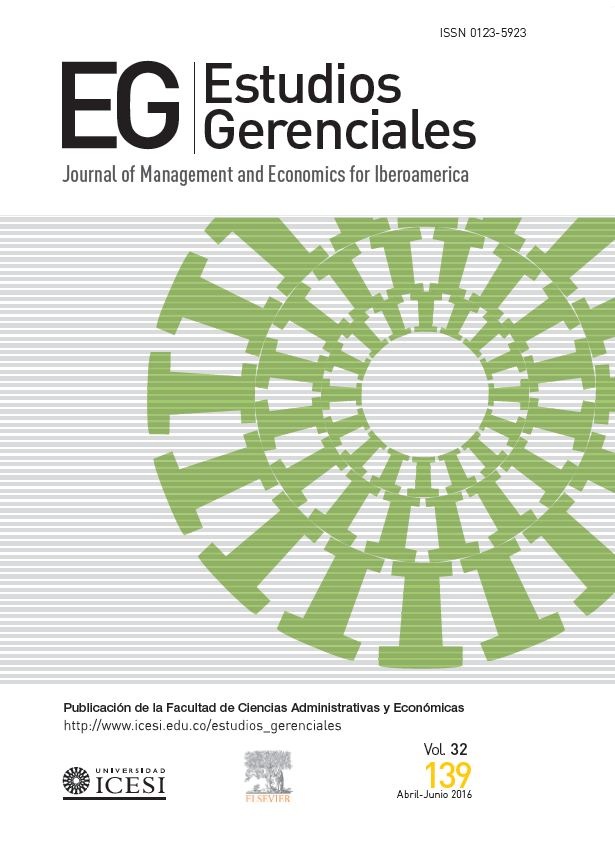Influencia de los estilos de liderazgo en el desempeno de las empresas ˜ exportadoras colombianas
DOI:
https://doi.org/10.1016/j.estger.2016.04.001Keywords:
Liderazgo, Desempeño exportador, Método clústerAbstract
Este artículo parte de la teoría de rasgos de liderazgo para analizar la influencia del tipo de liderazgo de las empresas colombianas sobre su desempeño exportador. Para cumplir este objetivo se utiliza una base de datos de 306 empresas exportadoras colombianas y por medio de un análisis de conglomerados bietápico se analizan los diferentes tipos de liderazgo: democrático, autocrático y liberal. Los resultados obtenidos identifican un conglomerado de empresas con alto desempeño exportador que combinan el liderazgo liberal y el democrático, mientras que el segundo conglomerado está conformado por las empresas con bajo desempeño exportador que asumen un liderazgo liberal. Se concluye que para alcanzar niveles de desempeño superior los gerentes colombianos ejercen el liderazgo como un equilibrio entre libertad y control.
Downloads
References
Bass, B. M. (2008). The Bass handbook of leadership. Theory, research & managerial applications (4.a ed.). New York: Free Press.
Blake, R. R. y Mouton, J. S. (1964). The managerial grid. Houston, TX: Gulf.
Cotae, F. (2009). Internationalization Sigmoid. Paper presented at the GCRJ Conference, Las Vegas.
Escandón Barbosa, D. y Hurtado Ayala, A. (2014). Factores que influyen en el desarrollo exportador de las pymes en Colombia. Estudios Gerenciales, 30(131), 172–183.
Fillis, I. (2000). Being creative at the marketing/entrepreneurship interface: lessons from the art industry. Journal of Research in Marketing and Entrepreneurship, 2(2), 125–137.
Gázquez, J., Jiménez, D., Sáez, E. y Sánchez, M. (2010). El Comportamiento de cambio de canal del telespectador en prime time. Análisis a través de un panel de audimetría. Revista Española de Investigación de Marketing ESIC, 14(2), 31–66.
Ghiselli, E. (1970). Psicología industrial, su aplicación al personal de la empresa. La Habana: Revolucionaria.
Gibson, J. L., Ivanchevich, J. M. y Donnelly, J. M. (1994). Las organizaciones. Wilmington: Addison Wesley Iberoamericana.
Gómez-Rada, C. (2002). Liderazgo: conceptos, teorías y hallazgos relevantes. Cuadernos Hispanoamericanos de Psicología, 2(2), 61–77.
Gonos, J. y Gallo, P. (2013). Model for leadership style evaluation. Management, 18(2), 157–168.
Hair, J., Anderson, J., Tatham, R. y Black, W. (1999). Análisis multivariante (5.a ed). Madrid: Prentice Hall.
Hersey, P. y Blanchard, K. H. (1996). Great ideas revisited. Training and Development Journal, 50(1), 42–47.
Hughes, M., Hughes, P. y Morgan, R. E. (2007). Exploitative learning and entrepreneurial orientation alignment in emerging young firms: Implications for market and response performance. British Journal of Management, 18(4), 359–375.
Jansson, H. y Sandberg, S. (2008). Internationalization of small and medium sized enterprises in the Baltic Sea Region. Journal of International Management, 14(1), 65–77.
Johanson, J. y Vahlne, J. (1977). The internationalization process of the firm: A model of knowledge development and increasing foreign market commitment. Journal of International Business Studies, 8(1), 23–32.
Keh, H. T., Nguyen, T. T. M. y Ng, H. P. (2007). The effects of entrepreneurial orientation and marketing information on the performance of SMEs. Journal of Business Venturing, 22(4), 592–611.
Knight, G. A. (2001). Entrepreneurship and strategy in the international SME. Journal of International Management, 7(3), 155–171.
Kreitner, R. y Kinicki, A. (1997). Comportamiento de las organizaciones. Madrid: McGraw Hill.
Kuivalainen, O., Sundqvist, S., Puumalainen, K. y Cadogan, J. W. (2004). The effect of environmental turbulence and leader characteristics on international performance: Are knowledge-based firms different? Canadian Journal of Administrative Sciences, 21(1), 35–50.
Lewin, K., Lippitt, R. y White, R. K. (1939). Patterns of aggressive behavior in experimentally created ''social climates''. Journal of Social Psychology, 10(2), 271–299.
Luo, Y. D. y Tung, R. L. (2007). International expansion of emerging market enterprises: A springboard perspective. Journal of International Business Studies, 38(4), 481–498.
Miller, D. (1983). The correlates of entrepreneurship in three types of firms. Management Science, 29(7), 770–791.
Mintzberg, H. (1983). La naturaleza del trabajo directivo. Barcelona: Editorial Ariel. Oviatt, B. y McDougall, P. (1994). Toward a theory of international new ventures. Journal of International Business Studies, 25(1), 45–64.
Rialp, A. (1999). Los enfoques microorganizativos de la internacionalización de la empresa: una revisión y síntesis de la literatura. Información Comercial Española. Revista de Economía, 781, 117–128.
Rialp, A. y Rialp, J. (2005). Las formas actuales de penetración y desarrollo de los mercados internacionales: Caracterización, marcos conceptuales y evidencia empírica en el caso español. Claves de la Economía Mundial, 99–108.
Robbins, S. (1999). Comportamiento organizacional. México: Prentice Hall. Stogdill, R. M. (1948). Personal factors associated with leadership: A survey of the literature. Journal of Psychology, 25, 35–71.
Vilá-Baños, R., Rubio-Hurtado, M., Berlanga-Silvente, V. y Torrado-Fonseca, M. (2014). Cómo aplicar un clúster jerárquico en SPSS. Revista D'innovació I Recerca En Educació, 7(1), 113–127.
Vroom, V. y Yetton, P. (1973). Leadership and decision making. Pittsburgh: University of Pittsburgh Press.
Warrick, D. (1981). Leadership styles and their consequences. Journal of Experiential Learning and Simulation, 3-4, 155–172.
Wiklund, J. y Shepherd, D. A. (2003). Knowledge-based resources, entrepreneurial orientation and the performance of small and medium-sized businesses. Strategic Management Journal, 24(13), 1307–1314.
Yamakawa, Y., Peng, M. W. y Deeds, D. L. (2008). What drives new ventures to internationalize from emerging to developed economies? Entrepreneurship Theory and Practice, 32(1), 59–82.
Zaleznik, A. (1990). The leadership gap. The Executive, 4(1), 7–22.
Zou, S., Taylor, Ch. y Osland, G. (1998). The EXPERF Scale: A crossnational generalized export performance measure. Journal of International Marketing, 6(3), 37–58.
Downloads
Published
Issue
Section
License
Articles are the sole responsibility of their authors, and will not compromise Icesi’s University principles or policies nor those of the Editorial Board of the journal Estudios Gerenciales. Authors authorize and accept the transfer of all rights to the journal, both for its print and electronic publication. After an article is published, it may be reproduced without previous permission of the author or the journal but the author(s), year, title, volume, number and range of pages of the publication must be mentioned. In addition, Estudios Gerenciales must be mentioned as the source (please, refrain from using Revista Estudios Gerenciales).








